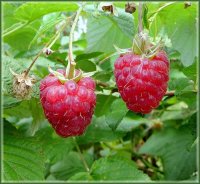Малина

The Russian word for raspberry is малина. Raspberries are commonly used in Russia to treat sick throats and fevers during the chilly months of winter when colds are very common. As a little girl, I caught colds often and my grandmother made me hot black tea and added fresh raspberries to calm my throat. Sometimes she would add raspberry jam right into my tea which gave it a fruity sweetness. When I lay sick in my bed, my grandmother would come to me and say «ты хочешь чай с малиной?» meaning, “would you like some tea with raspberries?”
If I had one raspberry, I would say «у меня одна малина» "I have one raspberry". However, if I have more than one raspberry, I would use the plural term for raspberry (малины) and say «у меня две малины» "I have two raspberries".
2 comments
Читая пост про малину, сразу вспомнилась вероятно самая знаменитая за рубежом русская песня “Калинка” (также широко известная как “Калинка-малинка").
Olga, the writer of the малина entry, speaks delightful family-style Russian, but some readers will probably object to her phrase «две малины». In academic Russian малина means “raspberry plant” or “a quantity of the fruit of the raspberry plant;” it doesn’t usually indicate individual berries. Thus in a textbook one is more likely to read «две ягоды малины» “two berries of raspberry.” In conversational Russian one is likely to hear «две малинки».
Finally, Olga describes малины in «две малины» as a plural. People who read their grammar books carefully will object that малины in this case is a genitive singular form, not a plural form. That, at least, is the standard description of the noun form after the numbers два-две in books that divide Russian into six cases. Truth to tell, Russian actually has more than six cases; the noun and adjective forms that appear after the numbers два, две, три, and четыре require us to acknowledge not one but two “paucal” cases if we follow a standard definition of case.
See Comrie for a standard definition of case.
See Livingston for a discussion of “paucal” cases.
Form is loading...